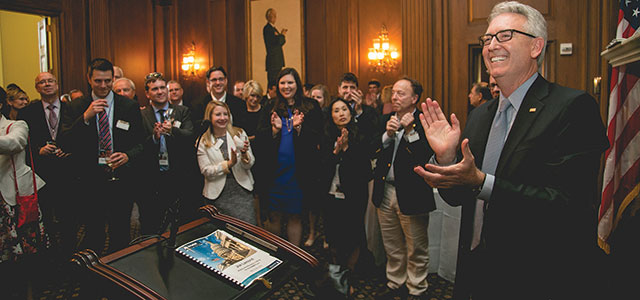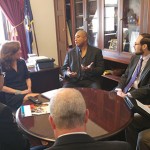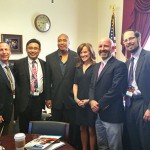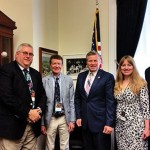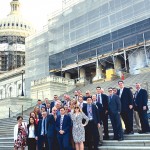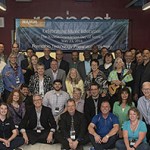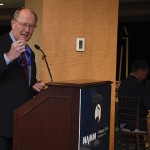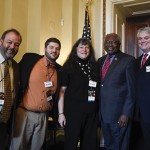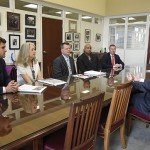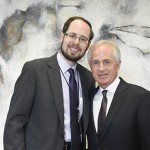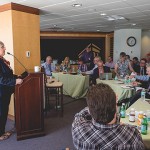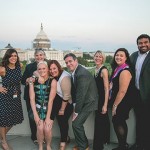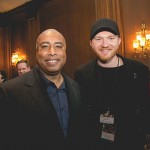
Twenty-fifteen ended on a triumphal note for many in the music products industry, as Congress passed the Every Student Succeeds Act (ESSA) on December 9 and, the next day, President Obama signed it into law. MI industry members, who have traveled to Capitol Hill annually since 2005 for the NAMM Music Education Advocacy DC Fly-In, had fought hard for the ESSA. The law, which replaced the No Child Left Behind Act (NCLB), for the first time explicitly defines a “well-rounded education” to include music. This contrasts sharply with NCLB, which shifted most resources to tested subjects, diverting funding from programs like art and music. The wind at our back, NAMM’s team of music industry leaders and artists swarmed the halls of Capitol Hill in May to thank our representatives for shepherding through the ESSA, as well as to urge full funding of the programs the law authorizes.
According to NAMM’s President and CEO, Joe Lamond, “With the passage of the ESSA, this trip to DC felt different. It seemed like we’d turned a corner and that the elected officials we met with finally understood the value of a well-rounded education that includes music and the arts, versus just focusing on math and reading.”
Particularly gratifying for Mary Luehrsen, NAMM’s Executive Director of Public Affairs, was the size of this year’s group, which organized more than 150 meetings. “Over 90 delegates joined us, our largest contingent yet!” she enthused, adding that participating industry members “continued to nurture their relationships with their elected officials and be educated on the latest in music-education policy.” She continued, “NAMM members who participated gained greater perspective on how the new law relates to music education back in their home states and communities. Now, it’s time to ramp up our efforts there.” Indeed, although it’s essential that congressional appropriations be sufficient to fund ESSA-authorized programs fully, the law delegates substantial authority to the states with respect to how to use federal money. (More tips on effective state-level advocacy are coming up.)
On the federal appropriations side, NAMM delegates centered their “ask” on faithfully implementing the ESSA in prioritizing funding, particularly for the Education for the Disadvantaged program (Title I-A) and the Student Support and Academic Enrichment Grants program (Title IV-A). As a result of the law’s eschewal of “core academic subjects” language in favor of a “well-rounded education,” federal funds will be available for music programs in the same way as they are for science, mathematics and other subjects. The law will allow funds to support professional development for music educators; it’ll permit states to choose various metrics to show progress in schools, including, for example, student engagement and school culture/climate; and it’ll consolidate current programs into formula block grants to school districts, a specific percentage of which must go toward a “well-rounded education.”
As usual, NAMM and its partners at Nelson Mullins Riley & Scarborough LLP delivered a full day of advocacy preparation for the delegates, including an ESSA overview delivered by a staffer from the Senate HELP (Health, Education, Labor and Pensions) Committee, ESSA implementation guidance from the U.S. Department of Education’s Deputy Director in the Office of State Support, and a 2016 politics and elections outlook from a U.S. Chamber of Commerce political strategist. Perhaps most useful, though, was the Bringing It Home roundtable discussion, which Luehrsen moderated and which featured speakers from the National Association for Music Education, Americans for the Arts and Quadrant Research. During that session, the assembled delegates learned how best to capitalize on the promise of the ESSA at the state, local and district level.
The speakers urged all music products industry members to visit the State Education Agency Directors of Arts Education Web site (seadae.org) and find out who in your state education agency is responsible for education in the arts. They also urged outreach to state legislators in whose districts you live and work to ensure that they’re familiar with you and your business, as well as your commitment to seeing music programs in your state fully funded. In the same vein, it’s essential that music store owners become familiar with music-education advocacy organizations, along with their coalitions, goals and initiatives.
“Advocates of music and arts education must make their voices heard back home,” Luehrsen stressed. “The ESSA clearly compels us to implement the opportunities now made available for more state and local control of arts education.” NAMM’s Coalition on Coalitions is the association’s program to support NAMM members that are working in their states and local communities. Its most recent gathering was held on June 24 at 12pm in Nashville’s Music City Center (Room 202A) in conjunction with Summer NAMM. Additional information is available at nammfoundation.org.
Apart from the 91 delegates’ in-the-trenches advocacy, the NAMM Music Education Advocacy DC Fly-In also incorporated a number of other activities and events. Chief among them were a Day of Service, the presenting of the SupportMusic Champion Award to Sen. Lamar Alexander (R-TN), a special reception for Turnaround Arts, which is a program under the President’s Committee on the Arts and the Humanities, and the bestowal of SupportMusic Awards from the NAMM Foundation. And, on the afternoon of May 26, a SupportMusic call, which included Secretary of Education John B. King, took place. Those additional experiences are some of the reasons why, according to Luehrsen, “Every year, I hear from delegates that the NAMM Fly-In is a life-changing experience.” As someone who participated in 2012, 2015 and this year, I can confirm that each year marks a career highlight, and a cherished memory.
Because so many of us are not only music retailers but also, and perhaps more importantly, music evangelists and educators, the Day of Service warrants particular attention. Held this year on May 23 at Friendship Technology Preparatory Academy, in the Washington DC suburb of Anacostia, the initiative saw a large percentage of the Fly-In delegates donate musical instruments and accessories to the school, as well as provide three hours of music education to 75 highly appreciative students. Workshops included a drum circle, guitar lessons and ukulele instruction. The Day of Service made evident music education’s transformative effect on children.
For 12 years now, NAMM has marshaled the music products industry’s forces for the Fly-In initiative, and each year seems to attract more MI leaders willing to devote their time to the betterment of our community. It’s something that makes Lamond particularly proud. “The NAMM members who came to DC are true champions,” he affirmed. “The returning veterans, as well as the many new folks, demonstrated real leadership.” And, even while acknowledging that it can be intimidating to walk the corridors of power on Capitol Hill, he underscored why it’s essential work. “We’re there to fight for music education for all children,” he said. “That’s a cause we all can believe in.”
“This is the opportunity to have an up-close-and-personal experience with our precious democracy,” Luehrsen added, “and to work together as NAMM members in a shared vision and mission for music education. When delegates depart DC, they have an even stronger conviction for their own lives in music, and they want to ensure that this opportunity is available to all children.” She closed with a statement I wholeheartedly endorse, and that I hope the entire industry will take to heart: “The NAMM Fly-In group is a mighty force for musical good. I urge NAMM members to join us.”
- Members of the New York delegation conferred with Rep. Kathleen Rice (D-NY).
- Delegates from New York posed with Rep. Kathleen Rice (D-NY) after a meeting.
- Rep. Charlie Dent (R-PA) spent time with delegates from C.F. Martin & Co.
- (L-R): Chris Martin of C.F. Martin & Co. with Rep. Phil Roe (R-TN).
- A portion of the NAMM Fly-In delegates gathered on the steps of Capitol Hill.
- A large number of Fly-In delegates participated in the Day of Service event.
- Sen. Lamar Alexander (R-TN).
- Members of the South Carolina contingent met with Rep. Jim Clyburn (D-SC).
- Delegates got an audience with Sen. Jack Reed (D-RI).
- Sen. Dean Heller (R-NV) was eager to hear delegates’ music-education message.
- (L-R): The Retailer’s Dan Ferrisi with Sen. Bob Corker (R-TN).
- Rep. Matt Cartwright (D-PA) reflected with delegates on music education’s value.
- Mary Luehrsen of NAMM is the longtime guiding light of the Fly-In.
- The indefatigable team from NAMM had a moment of levity.
- Bernie Williams and Eric Paslay.


